Postgraduate Dissertation Proposal: Tourism, Hospitality, and Events
VerifiedAdded on 2023/01/03
|8
|1708
|1
Project
AI Summary
This dissertation proposal outlines a study on the impact of social media on the success and performance of hospitality and tourism organizations. It defines the aim, objectives, and research methodology, which involves qualitative data collection through interviews with social media managers. The proposal details the sampling technique (purposive sampling), data analysis method (narrative analysis), and background information on the topic, including how social media influences customer engagement, productivity, employee performance, and brand image. The proposal also discusses the ways social media can be used to improve employee retention and the overall organizational performance. It highlights the importance of understanding social media's role in the industry, with a conclusion that summarizes the proposal's content and references relevant literature.
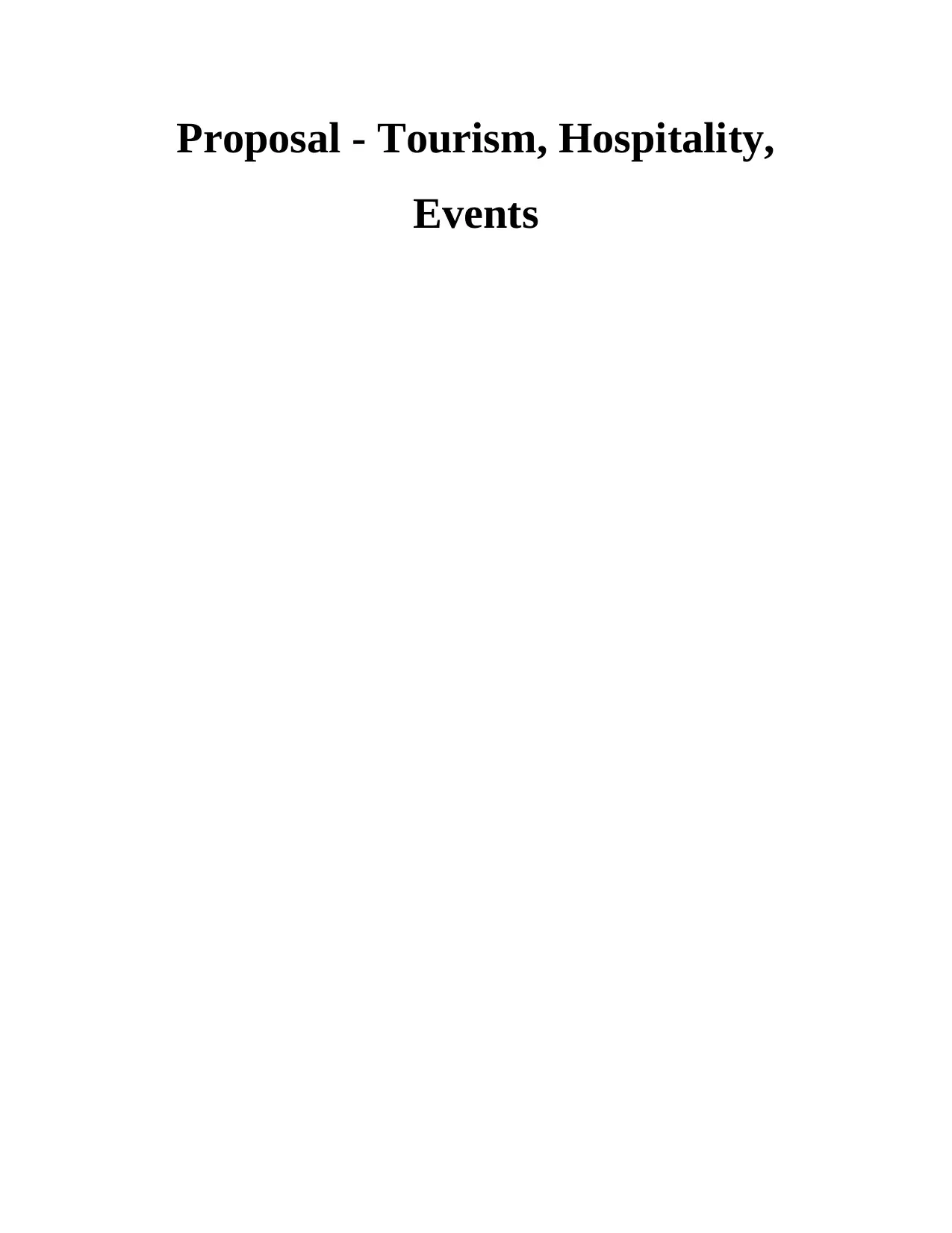
Proposal - Tourism, Hospitality,
Events
Events
Paraphrase This Document
Need a fresh take? Get an instant paraphrase of this document with our AI Paraphraser
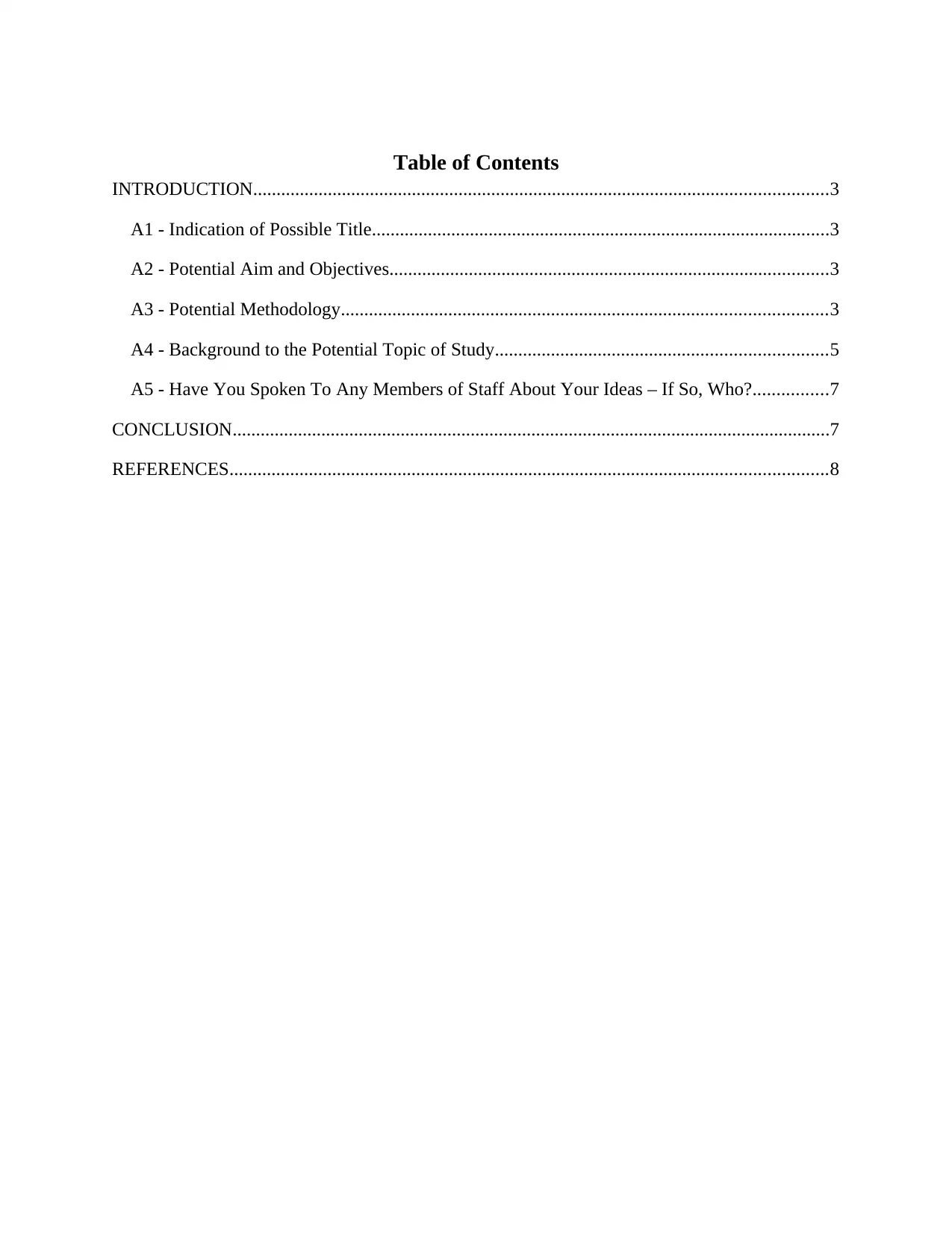
Table of Contents
INTRODUCTION...........................................................................................................................3
A1 - Indication of Possible Title..................................................................................................3
A2 - Potential Aim and Objectives..............................................................................................3
A3 - Potential Methodology........................................................................................................3
A4 - Background to the Potential Topic of Study.......................................................................5
A5 - Have You Spoken To Any Members of Staff About Your Ideas – If So, Who?................7
CONCLUSION................................................................................................................................7
REFERENCES................................................................................................................................8
INTRODUCTION...........................................................................................................................3
A1 - Indication of Possible Title..................................................................................................3
A2 - Potential Aim and Objectives..............................................................................................3
A3 - Potential Methodology........................................................................................................3
A4 - Background to the Potential Topic of Study.......................................................................5
A5 - Have You Spoken To Any Members of Staff About Your Ideas – If So, Who?................7
CONCLUSION................................................................................................................................7
REFERENCES................................................................................................................................8
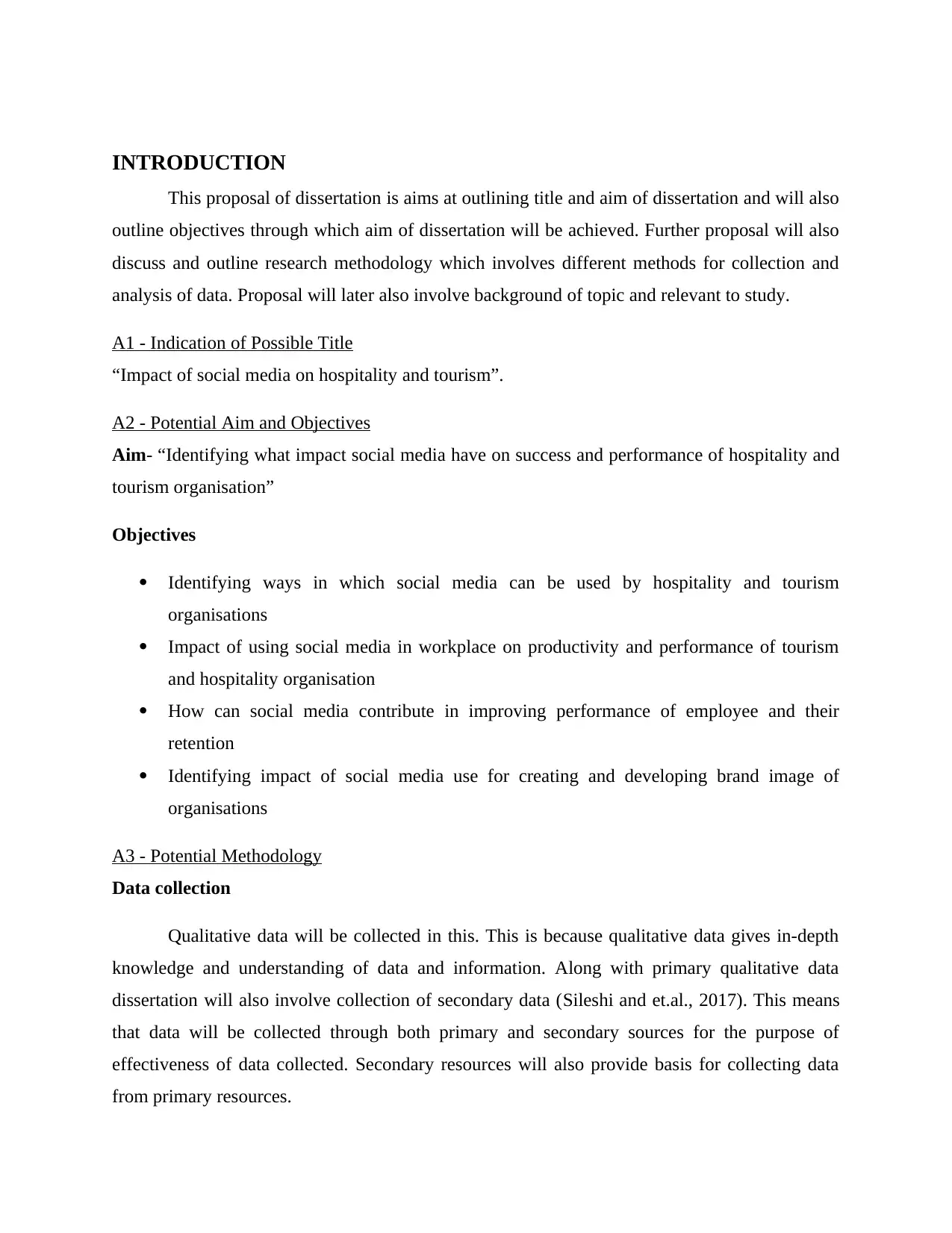
INTRODUCTION
This proposal of dissertation is aims at outlining title and aim of dissertation and will also
outline objectives through which aim of dissertation will be achieved. Further proposal will also
discuss and outline research methodology which involves different methods for collection and
analysis of data. Proposal will later also involve background of topic and relevant to study.
A1 - Indication of Possible Title
“Impact of social media on hospitality and tourism”.
A2 - Potential Aim and Objectives
Aim- “Identifying what impact social media have on success and performance of hospitality and
tourism organisation”
Objectives
Identifying ways in which social media can be used by hospitality and tourism
organisations
Impact of using social media in workplace on productivity and performance of tourism
and hospitality organisation
How can social media contribute in improving performance of employee and their
retention
Identifying impact of social media use for creating and developing brand image of
organisations
A3 - Potential Methodology
Data collection
Qualitative data will be collected in this. This is because qualitative data gives in-depth
knowledge and understanding of data and information. Along with primary qualitative data
dissertation will also involve collection of secondary data (Sileshi and et.al., 2017). This means
that data will be collected through both primary and secondary sources for the purpose of
effectiveness of data collected. Secondary resources will also provide basis for collecting data
from primary resources.
This proposal of dissertation is aims at outlining title and aim of dissertation and will also
outline objectives through which aim of dissertation will be achieved. Further proposal will also
discuss and outline research methodology which involves different methods for collection and
analysis of data. Proposal will later also involve background of topic and relevant to study.
A1 - Indication of Possible Title
“Impact of social media on hospitality and tourism”.
A2 - Potential Aim and Objectives
Aim- “Identifying what impact social media have on success and performance of hospitality and
tourism organisation”
Objectives
Identifying ways in which social media can be used by hospitality and tourism
organisations
Impact of using social media in workplace on productivity and performance of tourism
and hospitality organisation
How can social media contribute in improving performance of employee and their
retention
Identifying impact of social media use for creating and developing brand image of
organisations
A3 - Potential Methodology
Data collection
Qualitative data will be collected in this. This is because qualitative data gives in-depth
knowledge and understanding of data and information. Along with primary qualitative data
dissertation will also involve collection of secondary data (Sileshi and et.al., 2017). This means
that data will be collected through both primary and secondary sources for the purpose of
effectiveness of data collected. Secondary resources will also provide basis for collecting data
from primary resources.
⊘ This is a preview!⊘
Do you want full access?
Subscribe today to unlock all pages.

Trusted by 1+ million students worldwide
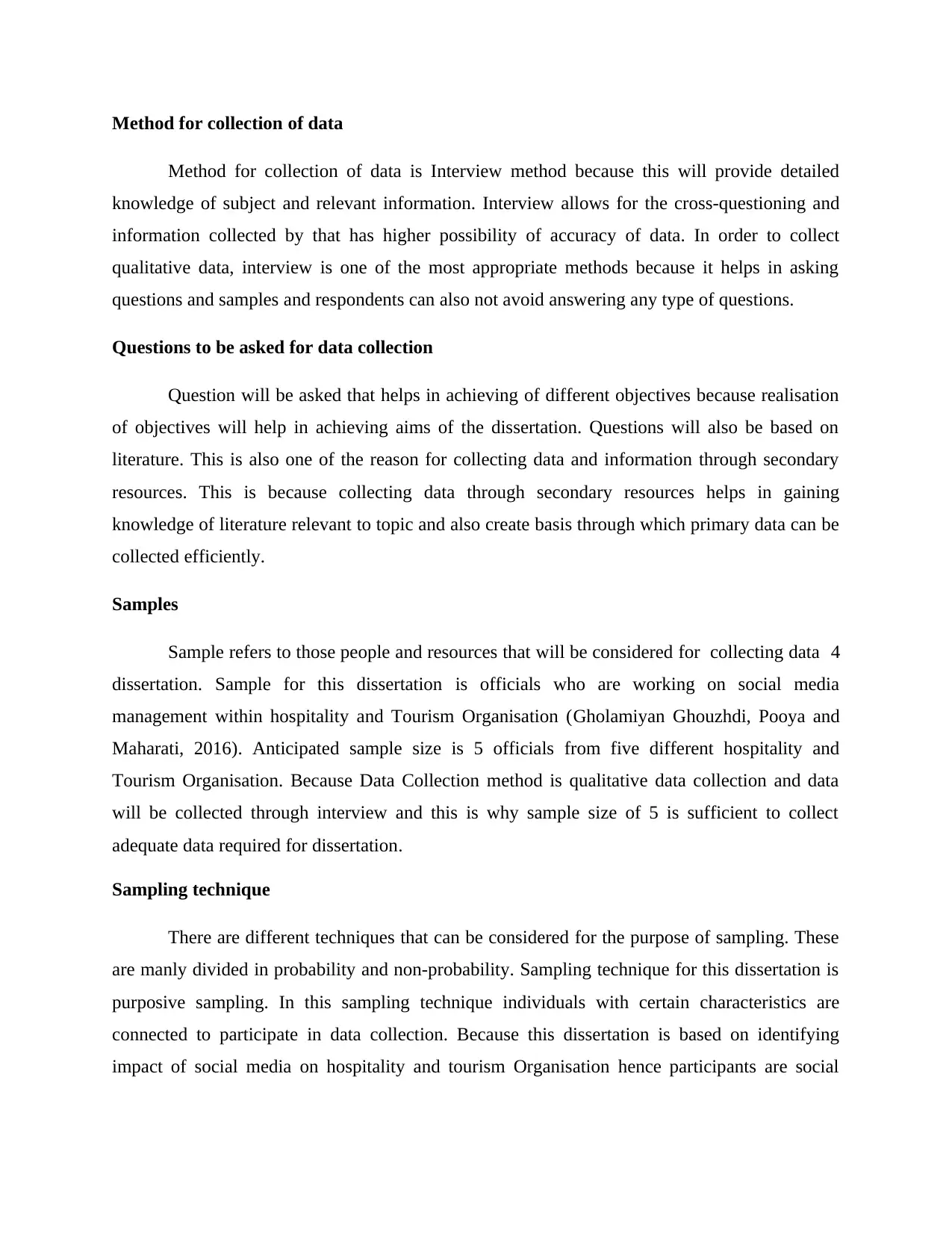
Method for collection of data
Method for collection of data is Interview method because this will provide detailed
knowledge of subject and relevant information. Interview allows for the cross-questioning and
information collected by that has higher possibility of accuracy of data. In order to collect
qualitative data, interview is one of the most appropriate methods because it helps in asking
questions and samples and respondents can also not avoid answering any type of questions.
Questions to be asked for data collection
Question will be asked that helps in achieving of different objectives because realisation
of objectives will help in achieving aims of the dissertation. Questions will also be based on
literature. This is also one of the reason for collecting data and information through secondary
resources. This is because collecting data through secondary resources helps in gaining
knowledge of literature relevant to topic and also create basis through which primary data can be
collected efficiently.
Samples
Sample refers to those people and resources that will be considered for collecting data 4
dissertation. Sample for this dissertation is officials who are working on social media
management within hospitality and Tourism Organisation (Gholamiyan Ghouzhdi, Pooya and
Maharati, 2016). Anticipated sample size is 5 officials from five different hospitality and
Tourism Organisation. Because Data Collection method is qualitative data collection and data
will be collected through interview and this is why sample size of 5 is sufficient to collect
adequate data required for dissertation.
Sampling technique
There are different techniques that can be considered for the purpose of sampling. These
are manly divided in probability and non-probability. Sampling technique for this dissertation is
purposive sampling. In this sampling technique individuals with certain characteristics are
connected to participate in data collection. Because this dissertation is based on identifying
impact of social media on hospitality and tourism Organisation hence participants are social
Method for collection of data is Interview method because this will provide detailed
knowledge of subject and relevant information. Interview allows for the cross-questioning and
information collected by that has higher possibility of accuracy of data. In order to collect
qualitative data, interview is one of the most appropriate methods because it helps in asking
questions and samples and respondents can also not avoid answering any type of questions.
Questions to be asked for data collection
Question will be asked that helps in achieving of different objectives because realisation
of objectives will help in achieving aims of the dissertation. Questions will also be based on
literature. This is also one of the reason for collecting data and information through secondary
resources. This is because collecting data through secondary resources helps in gaining
knowledge of literature relevant to topic and also create basis through which primary data can be
collected efficiently.
Samples
Sample refers to those people and resources that will be considered for collecting data 4
dissertation. Sample for this dissertation is officials who are working on social media
management within hospitality and Tourism Organisation (Gholamiyan Ghouzhdi, Pooya and
Maharati, 2016). Anticipated sample size is 5 officials from five different hospitality and
Tourism Organisation. Because Data Collection method is qualitative data collection and data
will be collected through interview and this is why sample size of 5 is sufficient to collect
adequate data required for dissertation.
Sampling technique
There are different techniques that can be considered for the purpose of sampling. These
are manly divided in probability and non-probability. Sampling technique for this dissertation is
purposive sampling. In this sampling technique individuals with certain characteristics are
connected to participate in data collection. Because this dissertation is based on identifying
impact of social media on hospitality and tourism Organisation hence participants are social
Paraphrase This Document
Need a fresh take? Get an instant paraphrase of this document with our AI Paraphraser
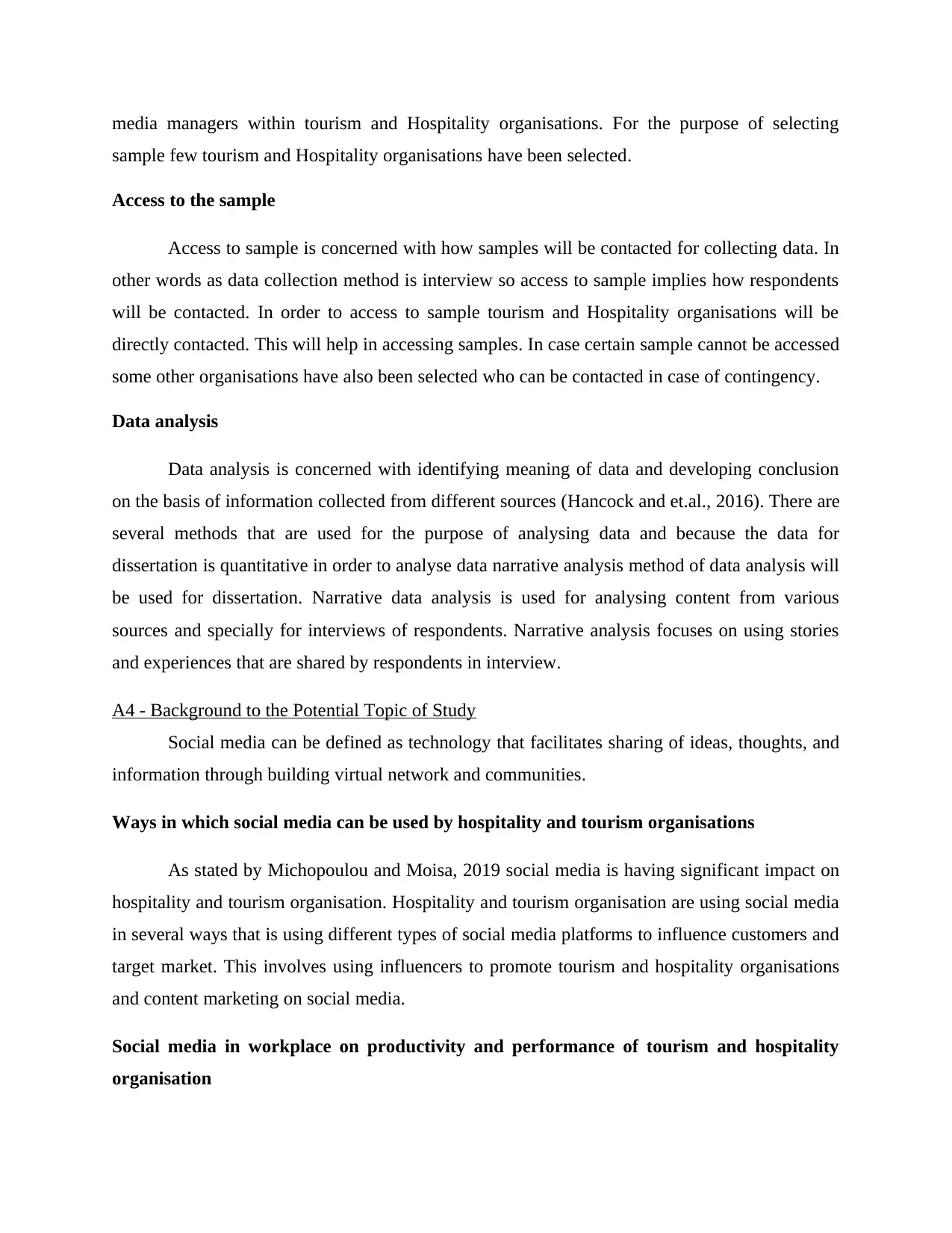
media managers within tourism and Hospitality organisations. For the purpose of selecting
sample few tourism and Hospitality organisations have been selected.
Access to the sample
Access to sample is concerned with how samples will be contacted for collecting data. In
other words as data collection method is interview so access to sample implies how respondents
will be contacted. In order to access to sample tourism and Hospitality organisations will be
directly contacted. This will help in accessing samples. In case certain sample cannot be accessed
some other organisations have also been selected who can be contacted in case of contingency.
Data analysis
Data analysis is concerned with identifying meaning of data and developing conclusion
on the basis of information collected from different sources (Hancock and et.al., 2016). There are
several methods that are used for the purpose of analysing data and because the data for
dissertation is quantitative in order to analyse data narrative analysis method of data analysis will
be used for dissertation. Narrative data analysis is used for analysing content from various
sources and specially for interviews of respondents. Narrative analysis focuses on using stories
and experiences that are shared by respondents in interview.
A4 - Background to the Potential Topic of Study
Social media can be defined as technology that facilitates sharing of ideas, thoughts, and
information through building virtual network and communities.
Ways in which social media can be used by hospitality and tourism organisations
As stated by Michopoulou and Moisa, 2019 social media is having significant impact on
hospitality and tourism organisation. Hospitality and tourism organisation are using social media
in several ways that is using different types of social media platforms to influence customers and
target market. This involves using influencers to promote tourism and hospitality organisations
and content marketing on social media.
Social media in workplace on productivity and performance of tourism and hospitality
organisation
sample few tourism and Hospitality organisations have been selected.
Access to the sample
Access to sample is concerned with how samples will be contacted for collecting data. In
other words as data collection method is interview so access to sample implies how respondents
will be contacted. In order to access to sample tourism and Hospitality organisations will be
directly contacted. This will help in accessing samples. In case certain sample cannot be accessed
some other organisations have also been selected who can be contacted in case of contingency.
Data analysis
Data analysis is concerned with identifying meaning of data and developing conclusion
on the basis of information collected from different sources (Hancock and et.al., 2016). There are
several methods that are used for the purpose of analysing data and because the data for
dissertation is quantitative in order to analyse data narrative analysis method of data analysis will
be used for dissertation. Narrative data analysis is used for analysing content from various
sources and specially for interviews of respondents. Narrative analysis focuses on using stories
and experiences that are shared by respondents in interview.
A4 - Background to the Potential Topic of Study
Social media can be defined as technology that facilitates sharing of ideas, thoughts, and
information through building virtual network and communities.
Ways in which social media can be used by hospitality and tourism organisations
As stated by Michopoulou and Moisa, 2019 social media is having significant impact on
hospitality and tourism organisation. Hospitality and tourism organisation are using social media
in several ways that is using different types of social media platforms to influence customers and
target market. This involves using influencers to promote tourism and hospitality organisations
and content marketing on social media.
Social media in workplace on productivity and performance of tourism and hospitality
organisation
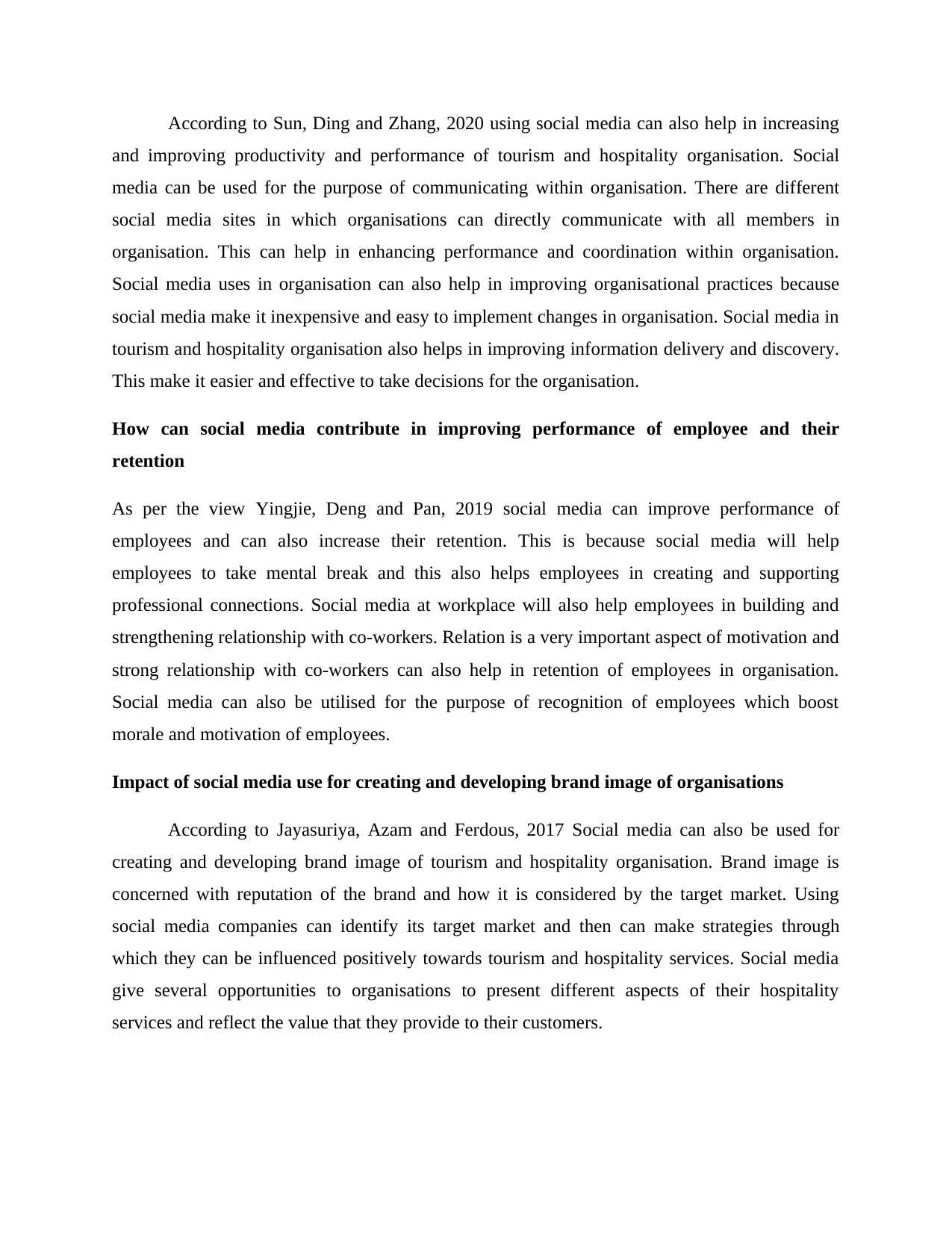
According to Sun, Ding and Zhang, 2020 using social media can also help in increasing
and improving productivity and performance of tourism and hospitality organisation. Social
media can be used for the purpose of communicating within organisation. There are different
social media sites in which organisations can directly communicate with all members in
organisation. This can help in enhancing performance and coordination within organisation.
Social media uses in organisation can also help in improving organisational practices because
social media make it inexpensive and easy to implement changes in organisation. Social media in
tourism and hospitality organisation also helps in improving information delivery and discovery.
This make it easier and effective to take decisions for the organisation.
How can social media contribute in improving performance of employee and their
retention
As per the view Yingjie, Deng and Pan, 2019 social media can improve performance of
employees and can also increase their retention. This is because social media will help
employees to take mental break and this also helps employees in creating and supporting
professional connections. Social media at workplace will also help employees in building and
strengthening relationship with co-workers. Relation is a very important aspect of motivation and
strong relationship with co-workers can also help in retention of employees in organisation.
Social media can also be utilised for the purpose of recognition of employees which boost
morale and motivation of employees.
Impact of social media use for creating and developing brand image of organisations
According to Jayasuriya, Azam and Ferdous, 2017 Social media can also be used for
creating and developing brand image of tourism and hospitality organisation. Brand image is
concerned with reputation of the brand and how it is considered by the target market. Using
social media companies can identify its target market and then can make strategies through
which they can be influenced positively towards tourism and hospitality services. Social media
give several opportunities to organisations to present different aspects of their hospitality
services and reflect the value that they provide to their customers.
and improving productivity and performance of tourism and hospitality organisation. Social
media can be used for the purpose of communicating within organisation. There are different
social media sites in which organisations can directly communicate with all members in
organisation. This can help in enhancing performance and coordination within organisation.
Social media uses in organisation can also help in improving organisational practices because
social media make it inexpensive and easy to implement changes in organisation. Social media in
tourism and hospitality organisation also helps in improving information delivery and discovery.
This make it easier and effective to take decisions for the organisation.
How can social media contribute in improving performance of employee and their
retention
As per the view Yingjie, Deng and Pan, 2019 social media can improve performance of
employees and can also increase their retention. This is because social media will help
employees to take mental break and this also helps employees in creating and supporting
professional connections. Social media at workplace will also help employees in building and
strengthening relationship with co-workers. Relation is a very important aspect of motivation and
strong relationship with co-workers can also help in retention of employees in organisation.
Social media can also be utilised for the purpose of recognition of employees which boost
morale and motivation of employees.
Impact of social media use for creating and developing brand image of organisations
According to Jayasuriya, Azam and Ferdous, 2017 Social media can also be used for
creating and developing brand image of tourism and hospitality organisation. Brand image is
concerned with reputation of the brand and how it is considered by the target market. Using
social media companies can identify its target market and then can make strategies through
which they can be influenced positively towards tourism and hospitality services. Social media
give several opportunities to organisations to present different aspects of their hospitality
services and reflect the value that they provide to their customers.
⊘ This is a preview!⊘
Do you want full access?
Subscribe today to unlock all pages.

Trusted by 1+ million students worldwide
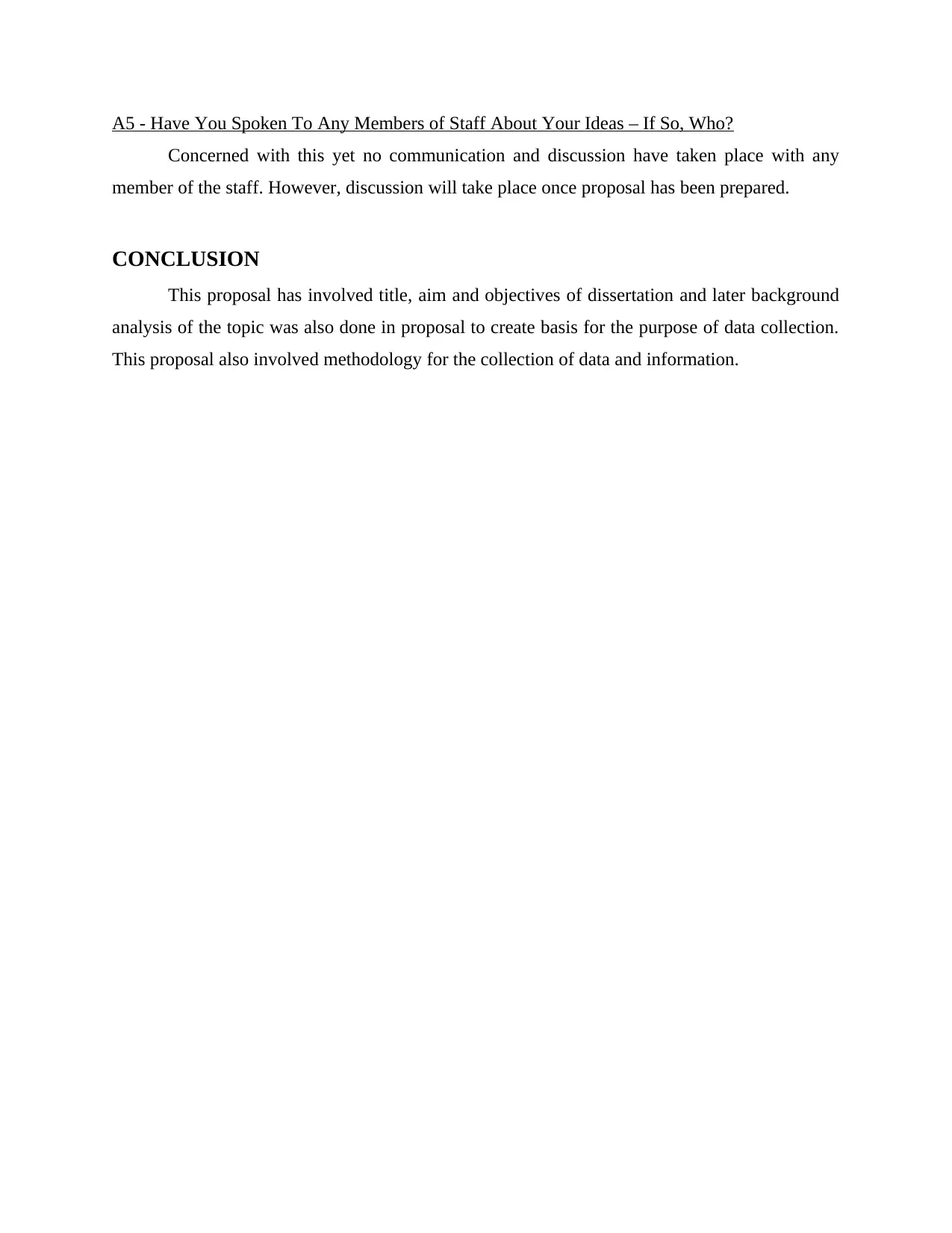
A5 - Have You Spoken To Any Members of Staff About Your Ideas – If So, Who?
Concerned with this yet no communication and discussion have taken place with any
member of the staff. However, discussion will take place once proposal has been prepared.
CONCLUSION
This proposal has involved title, aim and objectives of dissertation and later background
analysis of the topic was also done in proposal to create basis for the purpose of data collection.
This proposal also involved methodology for the collection of data and information.
Concerned with this yet no communication and discussion have taken place with any
member of the staff. However, discussion will take place once proposal has been prepared.
CONCLUSION
This proposal has involved title, aim and objectives of dissertation and later background
analysis of the topic was also done in proposal to create basis for the purpose of data collection.
This proposal also involved methodology for the collection of data and information.
Paraphrase This Document
Need a fresh take? Get an instant paraphrase of this document with our AI Paraphraser
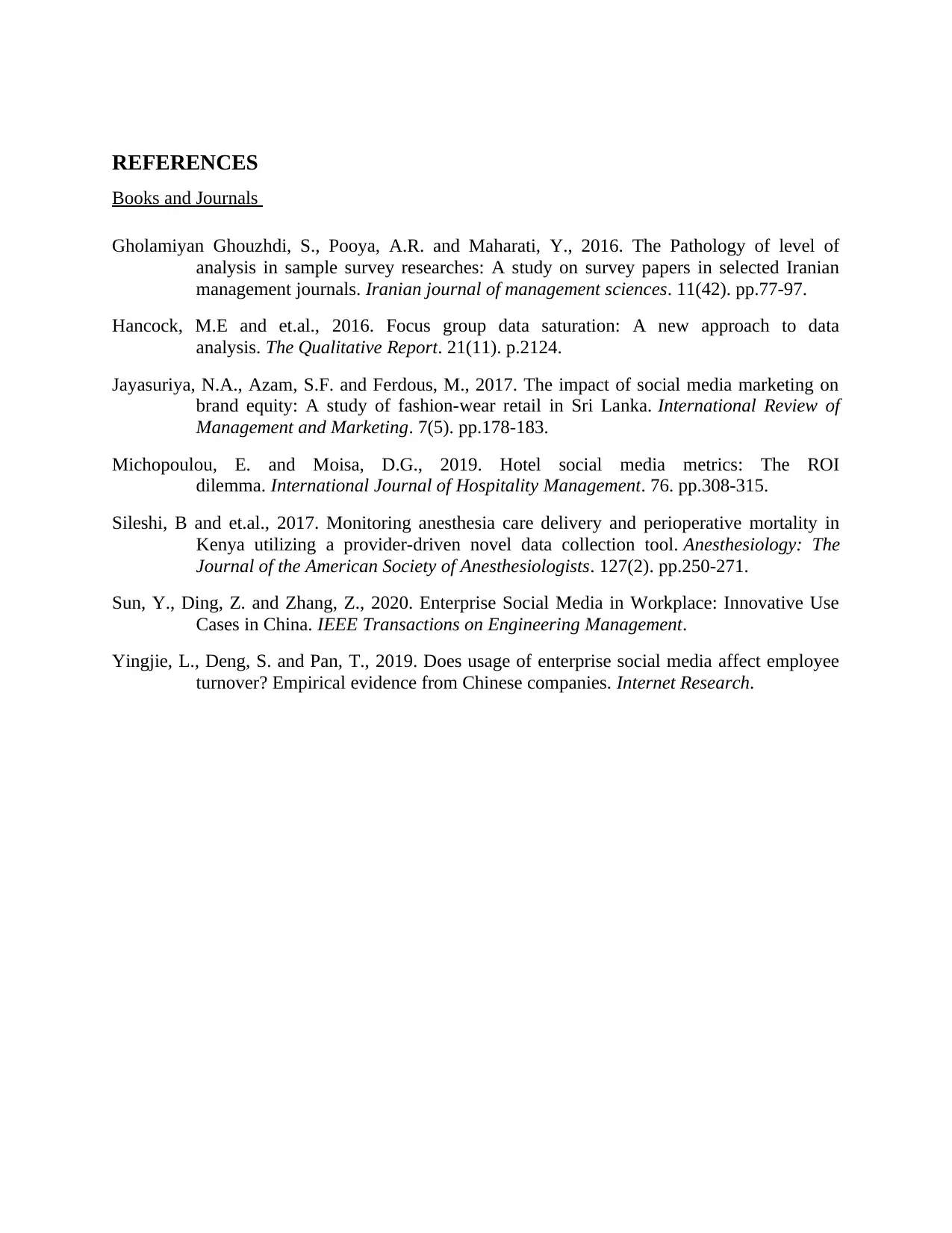
REFERENCES
Books and Journals
Gholamiyan Ghouzhdi, S., Pooya, A.R. and Maharati, Y., 2016. The Pathology of level of
analysis in sample survey researches: A study on survey papers in selected Iranian
management journals. Iranian journal of management sciences. 11(42). pp.77-97.
Hancock, M.E and et.al., 2016. Focus group data saturation: A new approach to data
analysis. The Qualitative Report. 21(11). p.2124.
Jayasuriya, N.A., Azam, S.F. and Ferdous, M., 2017. The impact of social media marketing on
brand equity: A study of fashion-wear retail in Sri Lanka. International Review of
Management and Marketing. 7(5). pp.178-183.
Michopoulou, E. and Moisa, D.G., 2019. Hotel social media metrics: The ROI
dilemma. International Journal of Hospitality Management. 76. pp.308-315.
Sileshi, B and et.al., 2017. Monitoring anesthesia care delivery and perioperative mortality in
Kenya utilizing a provider-driven novel data collection tool. Anesthesiology: The
Journal of the American Society of Anesthesiologists. 127(2). pp.250-271.
Sun, Y., Ding, Z. and Zhang, Z., 2020. Enterprise Social Media in Workplace: Innovative Use
Cases in China. IEEE Transactions on Engineering Management.
Yingjie, L., Deng, S. and Pan, T., 2019. Does usage of enterprise social media affect employee
turnover? Empirical evidence from Chinese companies. Internet Research.
Books and Journals
Gholamiyan Ghouzhdi, S., Pooya, A.R. and Maharati, Y., 2016. The Pathology of level of
analysis in sample survey researches: A study on survey papers in selected Iranian
management journals. Iranian journal of management sciences. 11(42). pp.77-97.
Hancock, M.E and et.al., 2016. Focus group data saturation: A new approach to data
analysis. The Qualitative Report. 21(11). p.2124.
Jayasuriya, N.A., Azam, S.F. and Ferdous, M., 2017. The impact of social media marketing on
brand equity: A study of fashion-wear retail in Sri Lanka. International Review of
Management and Marketing. 7(5). pp.178-183.
Michopoulou, E. and Moisa, D.G., 2019. Hotel social media metrics: The ROI
dilemma. International Journal of Hospitality Management. 76. pp.308-315.
Sileshi, B and et.al., 2017. Monitoring anesthesia care delivery and perioperative mortality in
Kenya utilizing a provider-driven novel data collection tool. Anesthesiology: The
Journal of the American Society of Anesthesiologists. 127(2). pp.250-271.
Sun, Y., Ding, Z. and Zhang, Z., 2020. Enterprise Social Media in Workplace: Innovative Use
Cases in China. IEEE Transactions on Engineering Management.
Yingjie, L., Deng, S. and Pan, T., 2019. Does usage of enterprise social media affect employee
turnover? Empirical evidence from Chinese companies. Internet Research.
1 out of 8
Related Documents
Your All-in-One AI-Powered Toolkit for Academic Success.
+13062052269
info@desklib.com
Available 24*7 on WhatsApp / Email
![[object Object]](/_next/static/media/star-bottom.7253800d.svg)
Unlock your academic potential
Copyright © 2020–2026 A2Z Services. All Rights Reserved. Developed and managed by ZUCOL.





